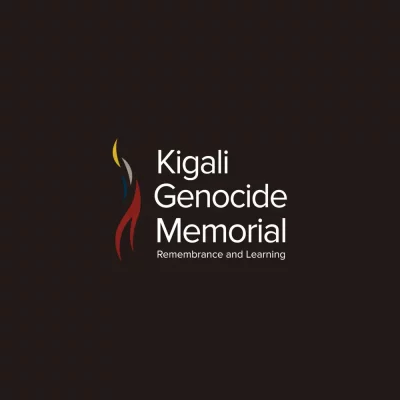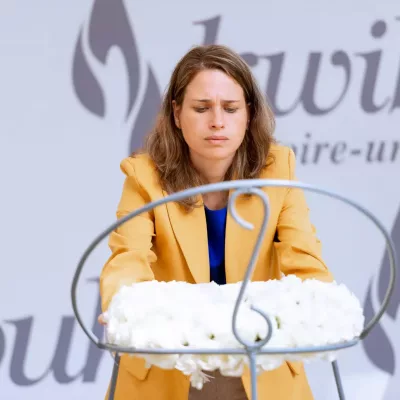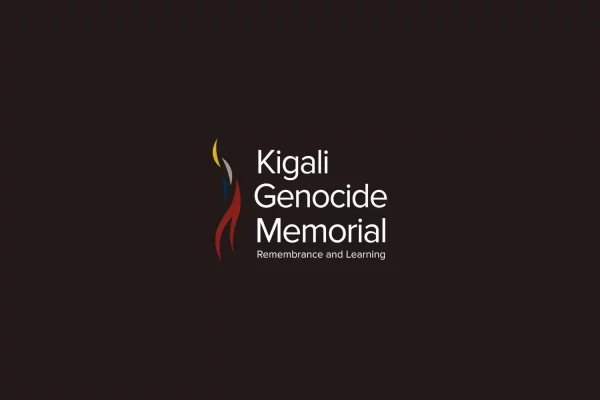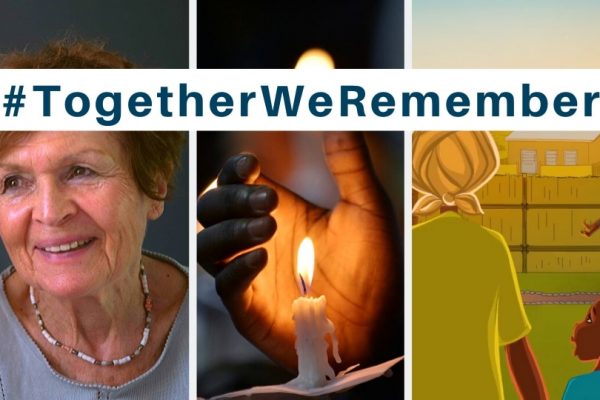On the eve of the 25th anniversary of the genocide at Srebrenica in Bosnia, survivors of the 1994 Genocide against the Tutsi in Rwanda are among those who have marked the occasion at the Kigali Genocide Memorial by lighting candles, observing a minute’s silence, and recording a short video message for Bosnian survivors: https://youtu.be/N-eLpOrs50M
All those taking part in the commemoration and video message are members of the Aegis Trust’s team in Rwanda, where the genocide prevention organisation established the Kigali Genocide Memorial in 2004. A site of remembrance and learning where over 250,000 victims of the Genocide against the Tutsi have their final resting-place, it continues to be managed by Aegis today on behalf of Rwanda’s National Commission for the Fight against Genocide (CNLG).
Freddy Mutanguha, Executive Director of the Aegis Trust, is among those who appear in the video message – speaking from the Kigali Genocide Memorial complex in front of a section of the exhibition dedicated to the genocide in Srebrenica and ethnic cleansing in Bosnia & Herzegovina, viewed by thousands of Rwandan students and international visitors every year.
“As we fight against denial of the Genocide of the Tutsi in Rwanda, we stand with the Srebrenica Genocide Memorial and the Bosnian survivor community in their constant fight against denial, both at home and abroad,” says Mutanguha. “We also pay tribute to them, especially to the Mothers of Srebrenica, for their strength and bravery over the last 25 years in the face of their tragic losses.”
On July 19th, Dr James Smith – founder and Chief Executive of the Aegis Trust – will bring together genocide survivors from Rwanda and Bosnia who now have leading roles at the Kigali and Srebrenica genocide memorials for a public webinar. Together they will explore shared experience, consider the legacy of genocide in their countries and discuss what lessons need to be applied today. Registration for the webinar, ‘From Kigali to Srebrenica’, is open now:
’From Kigali to Srebrenica’ will be the final event in the 2020 Ubumuntu Arts Festival, normally staged at the Kigali Genocide Memorial but going fully online this year due to the pandemic (17-19 July: see https://ubumuntuartsfestival.com/).
The genocide at Srebrenica had a major impact on the founders of Aegis, who in 1995 were on the point of launching the UK’s National Holocaust Centre.
“We were just weeks from opening the Holocaust Centre when this appalling news was coming out of Srebrenica,” says Dr James Smith. “Looking at Rwanda’s Genocide against the Tutsi and Bosnia’s Genocide at Srebrenica – not forgetting the concentration camps in Prijedor and Herzegovina, the massacres in Zvornik, Višegrad, Bijeljina and many other places, or the rape-camps in Foča – we understood very clearly that lessons from the Holocaust had not been learned.
“This set us on the road to establishing Aegis with a public health vision for future genocide prevention, because we believed that just as the spread of a disease is preventable because it’s predictable, so it should be with the virus of hate,” says Smith.
“We’ve learned much about this in the past 25 years, but have much more still to learn. We hope you will join us tomorrow in remembering with the survivors of genocide in Srebrenica, and we also hope you’ll register for our upcoming webinar on 19th July. It promises to be a remarkable and important conversation.”






